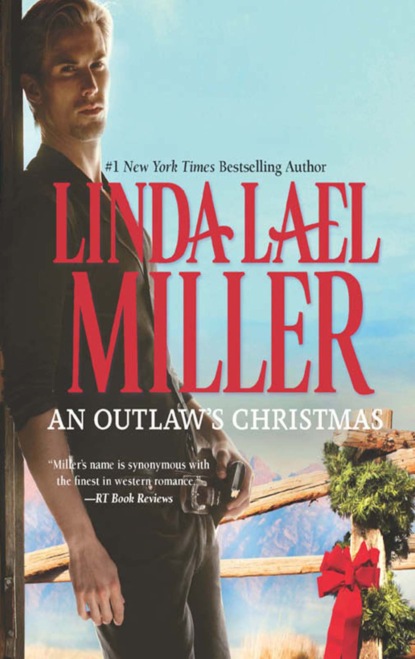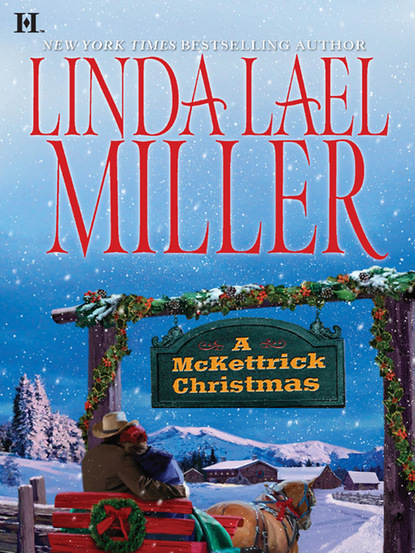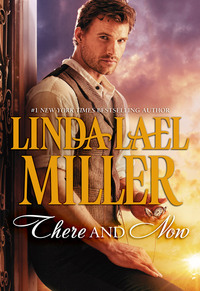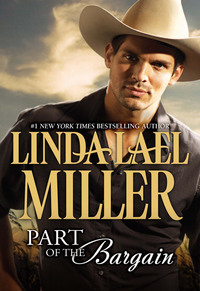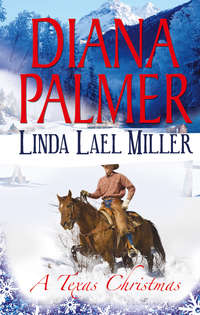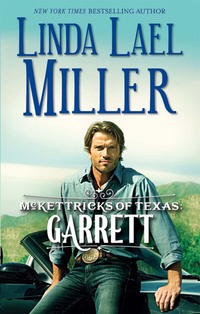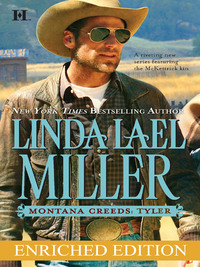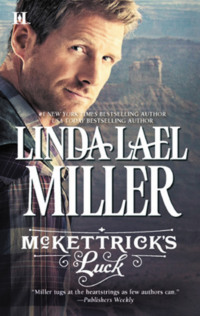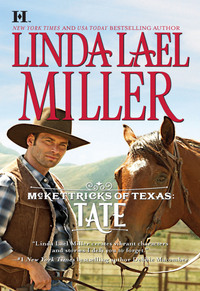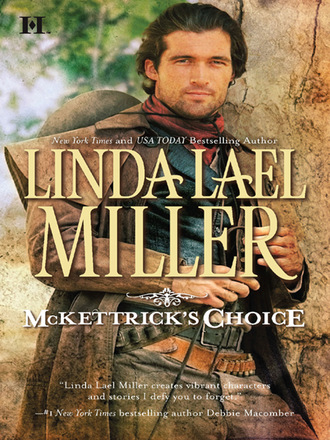
Полная версия
The McKettricks

Praise for the novels of
LINDA LAEL MILLER
“A passionate love too long denied drives the action in this multifaceted, emotionally rich reunion story that overflows with breathtaking sexual chemistry.”
—Library Journal on McKettricks of Texas: Tate
“As hot as the noontime desert.”
—Publishers Weekly on The Rustler
“This story creates lasting memories of soul-searing redemption and the belief in goodness and hope.”
—RT Book Reviews on The Rustler
“Loaded with hot lead, steamy sex and surprising plot twists.”
—Publishers Weekly on A Wanted Man
“Miller’s prose is smart, and her tough Eastwoodian cowboy cuts a sharp, unexpectedly funny figure in a classroom full of rambunctious frontier kids.”
—Publishers Weekly on The Man from Stone Creek
“[Miller] paints a brilliant portrait of the good, the bad and the ugly, the lost and the lonely, and the power of love to bring light into the darkest of souls. This is western romance at its finest.”
—RT Book Reviews on The Man from Stone Creek
“Sweet, homespun, and touched with angelic Christmas magic, this holiday romance reprises characters from Miller’s popular McKettrick series and is a perfect stocking stuffer for her fans.”
—Library Journal on A McKettrick Christmas
“An engrossing, contemporary western romance.”
—Publishers Weekly on McKettrick’s Pride (starred review)
“Linda Lael Miller creates vibrant characters and stories I defy you to forget.”
—#1 New York Times bestselling author Debbie Macomber
Linda Lael Miller
Mckettrick’s Choice

MILLS & BOON
Before you start reading, why not sign up?
Thank you for downloading this Mills & Boon book. If you want to hear about exclusive discounts, special offers and competitions, sign up to our email newsletter today!
SIGN ME UP!
Or simply visit
signup.millsandboon.co.uk
Mills & Boon emails are completely free to receive and you can unsubscribe at any time via the link in any email we send you.
Dear Reader,
By the time in which this story is set, the proud Comanche tribe had, for all practical intents and purposes, been confined to various reservations. I am convinced, however, that a few ragged bands of renegades still pursued the lost dream of regaining their land and I have included them here, for the sake of the tale itself.

For Jeshua, Stiller of storms
“That’s how the bastards get you—by making you scared. Don’t you ever let anybody or anything do that.”
—Angus McKettrick, patriarch of the
McKettrick family
CONTENTS
CHAPTER 1
CHAPTER 2
CHAPTER 3
CHAPTER 4
CHAPTER 5
CHAPTER 6
CHAPTER 7
CHAPTER 8
CHAPTER 9
CHAPTER 10
CHAPTER 11
CHAPTER 12
CHAPTER 13
CHAPTER 14
CHAPTER 15
CHAPTER 16
CHAPTER 17
CHAPTER 18
CHAPTER 19
CHAPTER 20
CHAPTER 21
CHAPTER 22
CHAPTER 23
CHAPTER 24
CHAPTER 25
CHAPTER 26
CHAPTER 27
CHAPTER 28
CHAPTER 29
CHAPTER 30
CHAPTER 31
CHAPTER 32
CHAPTER 33
CHAPTER 34
CHAPTER 35
CHAPTER 36
CHAPTER 37
CHAPTER 38
EPILOGUE
CHAPTER 1
Arizona Territory, August 12, 1888
HOLT MCKETTRICK hooked a finger under his fancy collar in a vain effort to loosen it a little. Wedding guests milled on the wide, grassy stretch of ground alongside the Triple M ranch house, their finery dappled by shivering patches of shade from the young oaks thriving there. Two fiddlers played a mournful rendition of “Lorena,” and there was a whole hog roasting in the pit Holt’s three half brothers had dug in the ground and lined with flat rocks from the creek. The wedding cake, baked by Holt’s sisters-in-law, was the size of a buckboard, and a long table—an improvised arrangement of planks supported by half a dozen fifty-gallon barrels—wobbled under the weight of a week’s worth of fancy grub.
The old man and the rest of the McKettrick outfit had spared no effort or expense to make the gathering memorable. Holt reckoned he might have enjoyed it as much as the next fellow—if he hadn’t been the bridegroom.
A hand struck his back in jovial greeting, and Holt nearly spilled his cup of fruit punch, generously laced with whiskey from his brother Rafe’s flask, down the front of his dandy suit.
“I reckon that’s the preacher, yonder,” said Holt’s father, Angus McKettrick, nodding toward an approaching rider splashing across the sun-dazzled creek, driving his horse hard. “’Bout time he showed up. I was beginning to think we’d have to send somebody out to the mission to fetch that crippled-up padre.”
Holt swallowed, squinted. Heat prickled the back of his neck. Something stirred in him, a sweet, aching feeling like he got on hot summer nights, when a high-country breeze curled around his brain like a voice calling him back to Texas.
“I reckon,” he muttered. Holt wondered where Rafe had gotten to with that flask, though he didn’t look away from the rider to search the crowd.
The newcomer, his features hidden in the glare of midafternoon light, spurred his horse up the creek bank on the near side, man and mount flinging off diamonds of water as they came.
“Margaret is a fine woman,” Angus said. He had a way of cutting a statement loose without laying any groundwork first.
“Who?” Holt asked, distracted. The skin between his shoulder blades itched, and his chest felt wet beneath the starched cotton of his shirtfront.
“Your bride,” Angus answered, with a note of exasperation. Out of the corner of his eye, Holt saw his father tug at the knot in his string tie. Like as not, his wife, Concepcion, had cinched it tight as a corset ribbon.
The rider gained the edge of the yard and dismounted with the hasty grace of a seasoned cowpuncher, leaving the reins to dangle. He came straight for Holt.
“That ain’t the preacher,” Angus remarked unnecessarily, and with concern. Though he had almost no formal education, the old man read till his eyes gave out, and when he let his grammar slip, it meant he was agitated.
Holt glanced toward the house, where Miss Margaret Tarquin, his bride-to-be, was shut away in an upstairs bedroom getting herself gussied up for the wedding, then went to meet the messenger. The fiddle-playing ground to a shrill halt, and a silence settled over the crowd. Even the kids and the dogs were quiet.
“I’m lookin’ for Holt Cavanagh,” the newly arrived young man announced. His denim trousers were wet with creek water, and he shivered, despite the shimmering heat of that August afternoon. “You’d be him, I reckon?”
Holt nodded in brusque acknowledgment. It didn’t occur to him to explain that he’d set aside the name Cavanagh, once he and the old man had made their blustery peace, and went by McKettrick these days.
Angus stuck close, bristly brows lowered, and Rafe, Kade and Jeb, elusive until then, seemed to materialize out of the rippling mirages haunting the grounds like ghosts. Holt and his brothers had had their differences in the three years they’d been acquainted—still did—but blood was blood. If the rider brought good news, they’d celebrate. If it was bad, they’d do what they could to help. And if there was trouble in the offing, they’d wade right into the fray and ask for the particulars later.
Holt’s affection for them, though sometimes grudging, was in his marrow.
The visitor handed over a slip of paper. “Frank Corrales told me to give you this. He sent you a telegram, and when you didn’t answer, he figured it didn’t go through and told me to hit the trail. I carried that there letter all the way from Texas.”
A shock of alarm surged through Holt, like venom from an invisible snake. He hesitated slightly, then snatched the soggy sheet of brown paper and unfolded it with a snap of his wrist. He felt his father and brothers move a stride closer.
He took in the words in a glance, absorbed the implications, and read them again to make sure he had the right of the situation.
JOHN CAVANAGH ABOUT TO BE DRIVEN OFF HIS LAND.
GABE TO HANG FOR A HORSE THIEF AND A MURDERER ON THE FIRST OF OCTOBER. COME QUICK.
FRANK CORRALES
Holt was still digesting the news when a feminine voice jarred him out of his stupor, and a slender hand came to rest on his coat sleeve. “Holt? Is something wrong?”
Holt started slightly, turned his head to look down into the upturned face of his bride-to-be, resplendent in her lacy finery and gossamer veil. She was a pretty woman, with fair hair and expressive blue eyes, a sent-for wife, imported all the way from Boston. Holt never looked at her without a stab of guilt; Margaret deserved a man who loved her, not one who wanted a mother for his young daughter, a bed companion for himself and not much else.
“I’ve got to go back to Texas,” he said. The words had been shambling along the far borders of his mind for a long while, but this was the first time he’d let them come to the fore, let alone find their way out of his mouth.
Angus cleared his throat, and the whole party started up again, like it was some sort of signal. Reluctantly, Rafe, Kade and Jeb moved off, and Angus handed the rider a five-dollar gold piece, then steered him toward the food table.
One of the ranch hands took care of the exhausted horse.
Margaret’s smile faltered a little as she gazed up at Holt, waiting.
“Maybe when I get back…” he began awkwardly, but then his voice just fell away.
She sighed, shook her head. “I don’t believe I want to wait, Holt,” she said. “If that’s what you’re asking me to do, I mean.”
He touched her face, let his hand fall back to his side. “I’m sorry,” he rasped, and he was, truly, though he doubted it would count for much in the grand scheme of things. At his brothers’ urging, he’d brought this woman out from the east, and now here she was, all got up in a bridal gown, with half the territory in attendance, and there wasn’t going to be a wedding.
“I’ll go ahead and marry you anyhow,” he said, against his every instinct, because he was Angus McKettrick’s son and a deal was a deal. But he couldn’t make himself sound like that was what he wanted, and Margaret was no fool. “I’ve still got to leave, though, either way.”
A tear shimmered on her cheek, but Margaret held her chin high, shook her head again. “No,” she said, with sad pride. “If you really wanted me for a wife, you’d have gone ahead with the ceremony, put a ring on my finger so everybody would know I was taken, maybe even asked me to come along.”
“It’ll be a hard trip,” Holt said. From a verbal standpoint, he felt like a lame cow, turning in fruitless circles, trying to find its way out of a narrow place in the trail. Nonetheless, he kept right on struggling. “Hard things to attend to, too, once I get there.”
She worked up another smile. “Godspeed, Holt McKettrick,” she said. Then, to his profound chagrin, she turned to face the gathering.
All attempts at merriment ceased, and a hush fell.
“There will be no wedding today,” Margaret announced, in a clear voice, while everyone stared back at her in bleak sympathy. Her spine, Holt noted, with admiration, was straight as a new fence post. “But there will be a party. I’m going upstairs right now and change out of this silly dress, and when I come back down again, I expect to find every last one of you making merry.”
With that, Margaret started for the house. Holt’s sisters-in-law, Emmeline, Mandy and Chloe, all flung poisonous glances in his direction and hurried after his retreating almost-bride.
Only Lizzie, Holt’s twelve-year-old daughter, had the temerity to approach him, and her cheeks glowed pink with indignation.
“Papa,” she demanded, coming to a stop directly in front of him, “how could you?”
Holt loved his child, though he hadn’t known she’d existed until last year, and except for Margaret herself, Lizzie was the hardest person in the crowd to face just then. “I’ve got business in Texas,” he said, because that was the stark truth and he had nothing else to offer. “It can’t wait.”
Lizzie stiffened, blinked her large hazel eyes, and bit her lower lip. “You’re leaving?”
He reached out to lay a hand on her shoulder, but she shrank from him.
“Lizzie,” he whispered.
She turned on her heel, fled to her grandfather. Angus put an arm around the child and glowered at Holt. The old man looked like Zeus himself, shooting thunderbolts from his eyes.
“Hell,” Holt muttered, and started for the barn.
His brothers fell in beside him, their faces hard. Holt lengthened his stride, but they stuck to his heels like barn muck. Stubborn cusses, cut from the same itchy cloth as their pa, every one of them.
“What the hell is going on here?” Rafe snarled. The firstborn of Angus’s three younger sons, Rafe was a bull of a man, and always the first to demand an accounting. He and Kade and Jeb formed a semicircle in front of Holt, barring his way into the barn, where his horse was stabled, blissfully unaware of the long, arduous ride ahead.
Holt might have shoved his way through, if he hadn’t figured that would lead to a fight. He wasn’t afraid of tangling, but a brawl would mean a delay, and the need to get where he was going made an urgent clench in the pit of his belly.
He pulled out the crumpled letter, thrust into his vest pocket earlier, and shoved it at Kade, who happened to be the one standing directly in front of him. “See for yourself,” he said.
Kade scanned the page, while Jeb and Rafe peered at it from either side.
“I’ll saddle your horse,” Kade said, handing it back. He was the middle brother, the thoughtful, practical one.
“Best pack yourself some of that wedding grub, too, for the trail.”
“Have a word with Lizzie before you go, Holt,” Rafe interjected. “She doesn’t look like she’s taking this real well.”
“I could ride along,” Jeb put in, with typical eagerness. The youngest of the brood, he was also the fastest gun, and hands-down the best rider. Jeb was handy to have around in a tight place, for those reasons and a few others, but the plain and simple truth was that Holt didn’t want to have to look out for him. He wasn’t fool enough to say so, though.
He might have grinned, if he hadn’t just humiliated a fine woman and learned that two of the best friends he’d ever had were in trouble. Jeb had a wife to look after, and a baby daughter, barely walking. Rafe and Kade were in the same situation, since all three of their brides had managed to come a-crop with babies a year ago last Independence Day.
“This is my fight,” Holt said. “I’ll handle it.”
Rafe looked thoughtful. “John Cavanagh. That’s the man who raised you, isn’t it?”
Holt nodded, though Rafe’s assessment didn’t begin to cover what Cavanagh meant to him. “He’s got a spread outside San Antonio.”
“And this Gabe yahoo…?” Jeb fished. “Who’s he?”
“We were Rangers together,” Holt explained. Gabe Navarro was a wild man—part Comanche, part Mexican, part devil—but he was neither a murderer nor a horse thief. Holt had known him too long and too well ever to believe either accusation.
Apparently satisfied, Kade headed into the barn to get Holt’s horse, Traveler, ready.
Rafe and Jeb went to the feast table and commenced gathering food for the journey. Holt looked for Lizzie and found her still in Angus’s arms, her head resting against the old man’s broad shoulder.
“Here, now,” Angus murmured, giving his eldest son an unfriendly but resigned glance as Holt approached. “You talk to your papa, Lizzie-beth. It’s no good parting without saying what needs to be said.”
Lizzie sniffled, raised her head, and met Holt’s gaze.
Angus squeezed her upper arm, then favoring Holt with a withering glare, he walked away.
“Are you coming back?” Lizzie wanted to know.
“Yes,” Holt said, with certainty. He wasn’t through with Texas—he’d left too many things undone there—but in the deepest part of his heart, he knew the Arizona Territory and the Triple M were home. He belonged on this stretch of red, rocky dirt, with his impossible father, his rowdy brothers and his spirited daughter.
She dashed at her face with the back of one hand. “You promise?”
“You have my word.”
“What if you can’t come home? What if somebody shoots you?”
“I will come back, Lizzie.”
“I guess I have to believe you.”
He chuckled, extended an arm. Lizzie hesitated, then curled against his chest, clinging a little. “You be a good girl,” he said, resting his chin on top of her dark head, wishing he didn’t have to leave her behind. “Mind Concepcion and your grandfather.”
She trembled, tugged a cherished blue ribbon from her hair and tucked it into Holt’s vest pocket. “A remembrance,” she said softly, and Holt’s heart ached. Before he could find words to assure his daughter that forgetting her would be impossible, she went on, “Are you going to visit Mama’s grave? She’s buried in San Antonio, in the cemetery behind Saint Ambrose’s.”
He nodded, still choked up. Lizzie’s mother, Olivia, was part of the unfinished business waiting for him in Texas. He needed to say a proper goodbye to her, put her to rest in his mind and his heart, even though it was too late for her to hear the words.
“Will you take her flowers—the best you can find—for me?”
Holt’s throat still wouldn’t open. He nodded again.
Lizzie stared into his face, looking, perhaps, for the half-truths people tell to children, or even a bold-faced lie. Finding only truth, she straightened her shoulders and hoisted her chin.
“All right, then,” she said. “I guess you’d better ride while there’s still enough daylight to see the trail.”
He smiled, cupped her chin in one hand. “Don’t eat too much cake,” he said.
Her eyes glistened with tears. “Don’t get yourself shot,” she countered.
And that was their farewell.
Lizzie was a woman-child, with the run of one of the biggest ranches in the Arizona Territory. She could already ride like a pony soldier, and Kade’s wife, Mandy, a sharpshooter, had taught her niece to handle a shotgun as well as a side arm. Lizzie had lost her mother to a fever and seen her aunt murdered in cold blood alongside a stagecoach. She knew only too well that life was fragile, the world was a dangerous place and that some partings were permanent.
This one wouldn’t be, Holt promised himself as he rode out, Lizzie’s ribbon in his pocket.
CHAPTER 2
San Antonio, Texas, August 25
THE WEDDING DRESS was a voluminous cloud of silk and tulle, billowing in Lorelei Fellows’s arms as she marched into the center of the square and dumped it in a heap next to the fountain.
She did not look at the crowd, gathered on all sides, their silence as still and heavy as the hot, humid afternoon. With a flourish, she took a small metal box from the waistband of her skirt, extracted a match and struck it against the bottom of one high-button shoe.
The acrid smell of sulphur wavered in the thick air, and the flame leaped to life. Lorelei stared at it for a moment, then dropped the match into the folds of the dress.
It went up with a satisfying whoosh, and Lorelei stepped back, a fraction of a moment before her skirt would have caught fire.
The crowd was silent, except for the man behind the barred window of the stockade overlooking the square. His grin flashed white in the gloom. He put his brown hands between the bars and applauded—once, twice, a third time.
Bits of flaming lace rose from the pyre of Lorelei’s dreams and shriveled into wafting embers. Her throat caught, and she almost put a hand to her mouth.
I will not cry, she vowed silently.
She was about to walk away, counting on her pride to hold her up despite her buckling knees, when she heard the click of a horse’s hooves on the paving stones.
Beside her, a tall man swung down from the saddle, covered in trail dust and sweating through his clothes, and proceeded to stomp out the conflagration with both feet. Lorelei stared at him, amazed at his interference. Once the fire was out, he had the effrontery to take hold of her arm.
“Are you crazy?” he demanded, and his hazel eyes blazed like the flames he’d just squelched.
The question touched a nerve, though she couldn’t have said why. Blood surged up her neck, and she tried to wrench free, but the stranger’s grasp only tightened. “Release me immediately,” she heard herself say.
Instead, he held on, glaring at her. The anger in his eyes turned to puzzlement, then back to anger.
“Holt?” called the man in the stockade, the one who’d clapped earlier. “Holt Cavanagh? Is that you?”
A grin spread over Cavanagh’s beard-stubbled face, and he turned his head, though his grip on Lorelei’s arm was as tight as ever.
“Gabe?” he called back.
“You’d best let go of Judge Fellows’s daughter, Holt,” Gabe replied, still grinning like a jackal. For a man sentenced to hang in a little more than a month, he was certainly cheerful—not to mention bold. “She might just gnaw off your arm if you don’t.”
Lorelei blushed again.
Holt turned to look down into her face. He tried to assume a serious expression, but his mouth quirked at one corner. “A judge’s daughter,” he said. “My, my. That makes you an important personage.”
“Let—me—go,” Lorelei ordered.
He waited a beat, then released her so abruptly that she nearly tripped over her hem and fell.
“You must be an outlaw,” she said, brushing ashes from her clothes and wondering why she didn’t just walk away, “if you’re on friendly terms with a horse thief and a killer.”
“And you must be a fool,” Holt replied, in acid reciprocation, “if you’d set a fire in the middle of town and then stand there like Joan of Arc bound to the stake.”
Gabe Navarro laughed, and then a cautious titter spread through the gathering of spectators.
At last, the starch came back into Lorelei’s knees, and she was able to turn and walk away, holding her head high and her shoulders straight. She looked neither left nor right, and the crowd wisely parted for her, though they stared after her, she knew that much. She felt their gazes like a faint tremor along the length of her spine. Felt Holt Cavanagh’s, too.
She lengthened her stride and, as soon as she’d turned a corner, leaving the square behind, she hoisted her singed skirts and stepped up her pace, wishing she could just keep on going until she’d left the whole state of Texas behind.
By the time she reached her father’s front gate, Lorelei was sure Holt Cavanagh—whoever he was—had heard all the salient details of her scandalous story.
Today was to have been her wedding day.
The cake was baked, and gifts had been arriving for weeks.
The honeymoon was planned, the tickets bought.
Every church bell in San Antonio was poised to ring out the glad tidings.
It would have been carried out, too, the whole glorious celebration—if the bride hadn’t just found her groom rolling on a featherbed with one of the housemaids.


